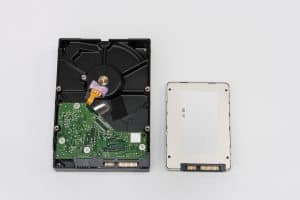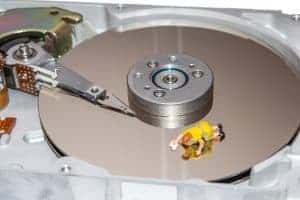We store our most precious pictures, data, and files on hard drive storage devices across various platforms. You will avoid the most common hard drive issues and know when it is time to backup your data if you follow a few simple tips.

Understand Your Hard Drive
Solid state drives [SSD drives] are becoming increasingly more popular. Their combined price and data capacity both served as barriers to users for a while; but, they have become more affordable and widely used. SSDs have become one of the best ways to speed up your PC. Users love the speed increase and are quickly adopting SSDs as the price becomes affordable. However, the average computer user still has at least one device that uses a mechanical hard drive.
All mechanical devices eventually fail. It is simply a matter of when. Solid state drives also fail and have a limited number of writing cycles before they die. However, hard drives can be a little bit less predictable.
Types Of Hard Drive Issues From Failure
The most common cause of hard drive failure is heat. This issue has been debated a lot amongst techs. Regardless of how you feel about the role heat plays in the destruction of the drive, it is best to assume the stance that more heat is bad for your equipment. High temperature and physical trauma are both terrible for the health of your hard drive.
The act of dropping a hard drive can often render it useless. A mechanical hard drive [HDD drive] is made of an aluminum player that spins. The hard drive has a read/write head that accesses the data on the platter. As the platter spins, the head is moving over it reading and writing data. Dropping the drive can knock the read/write head out of alignment. Once the read/write head is out of alignment or touches the platter, it can damage the aluminum platter destroying your data.
You have probably heard of the Click Of Death before. This is when that read/write head touches the aluminum platter. The noise you hear is the head repeatedly hitting the plater causing more and more damage to our data.
Age of the hard drive is also a major factor in the health of the equipment. Mechanical drives have many internal moving parts. Moving parts wear and tear over time, which causes the hard drive to degrade.
Mechanical drives are not alone when it comes to issues with temperature. SSDs are also prone to failures due to temperature. SSDs also have a limited storage life if not used for an extended period. The data on the SSDs will degrade over time if the drives don’t receive power.
Signs Of Hard Drive Issues
How do you know if your hard drive is going to fail? In most cases, the drive fails gradually. This is one of the advantages of owning a hard drive. It will often give you a series of signs and symptoms that will give you a warning signal to back up your data. Contrarily, solid state drives can often fail quite suddenly. Data recovery from solid state drives is often difficult, and nearly impossible in some cases.
Some manufacturers include built-in software that accompanies the drive. The software has the ability to monitor health and performance statistics of the equipment as it is used. Manufacturer software may also have the ability to tailor performance to curtail certain issues and issue a warning as problems arise. In this case, you will have some extra time to recognize hard drive issues and make sure your data backup is usable before your data is lost.
Slow & Corrupt Files
Vigilance is essential when it comes to maintaining your hard drive. Most importantly, take notice of how long it takes to perform simple tasks. The first warning sign that the drive is starting to go bad is the speed of data transfer becomes extremely slow. Your hard drive may be approaching the end of its life cycle if it takes an extended amount of time for you to transfer a small file.
As mentioned above mechanical hard drives are made up of tiny moving parts. All of these parts need to move very rapidly in order to function. Therefore, it is normal for computer equipment to make some noises. The read-head often makes clicking noises as it scans parts of the drive. On modern drives, the sound is usually very quiet and can not be heard. However, there may be a problem if you notice loud clicking sounds and noise while the drive is in use. Hearing noises when the unit is not in use is a cue to check your backup storage devices because you are experiencing hard drive issues.
Files that fail to open, or become corrupted files are another indication of possible issues. Sometimes this can be an indicator of a RAM issue. It is also a common sign that the hard drive is starting to go bad. If you are gaming or using an over-clocked system, the process may have also affected your SATA Bus, which would result in the hard drive having corrupted data on it.
SMART
Technology that tests for hard drive problems has been widely distributed among technology companies. Solid state drives and hard drives both have the capacity to use Self-Monitoring Analysis Reporting Technology (abbreviated SMART) to test whether the memory storage equipment is functioning properly. This technology uses software that interacts with compatible hardware to detect read errors, reallocated sectors, failing block count, erase failures, wear and lifetime usage statistics that may be indicative of significant issues. SMART technology will often give you time to replace the data before the hard drive fails completely.
Get The Most Time Out Of Your Hard Drive
Life cycles of the hard drive storage equipment can be extended significantly. Be sure not to agitate the unit, or introduce it to any sudden significant shock. You also want to be vigilant about keeping all your equipment completely vertical, or horizontal if it has any moving parts. Make sure you allow the unit to settle completely before moving it because the individual pieces may be agitating at a very high rate and result in permanent damage if there is an issue.
Focus on keeping the data storage unit cool to extend its life cycle. Something as simple as having a fan nearby to circulate the air around the unit may be very helpful. Installing an intake fan may be a good idea in some cases. Some laptops may benefit from using an extra cooling unit where its entire base is designed to get rid of heat.
Sometimes, the best thing you can do for your hard drive turns is to turn off your computer and allow it to cool when it is no longer in use. However, modern computers will now turn off hard drive’s activity if the computer is not used in awhile.
The best thing you can do is to backup your hard drive. Don’t let hard drive issues cause you problems.
Why Do Hard Drives Fail?
Less wear and tear is always a good thing. Be vigilant about the temperature of your memory storage devices and keep them from experiencing excessive heat. Heat causes damage in physical hard drives and ruins the ability of the solid state drives to store data in its cells. Monitor hard drives with software, and avoid physical trauma to the unit by handling it with care and keeping it level at all times. Put these principles into practice, and your hard drives will last indefinitely.
Call Us Today If You Would Like assistance With Protecting Your Hard Drive From Failure And Sign Up For Our Backup Software. Be sure To Sign-Up To Our PROfessional Newsletter.
Besides my love for computers, I am a motorcycle fanatic. I have a background in Office 365 support and windows server.
